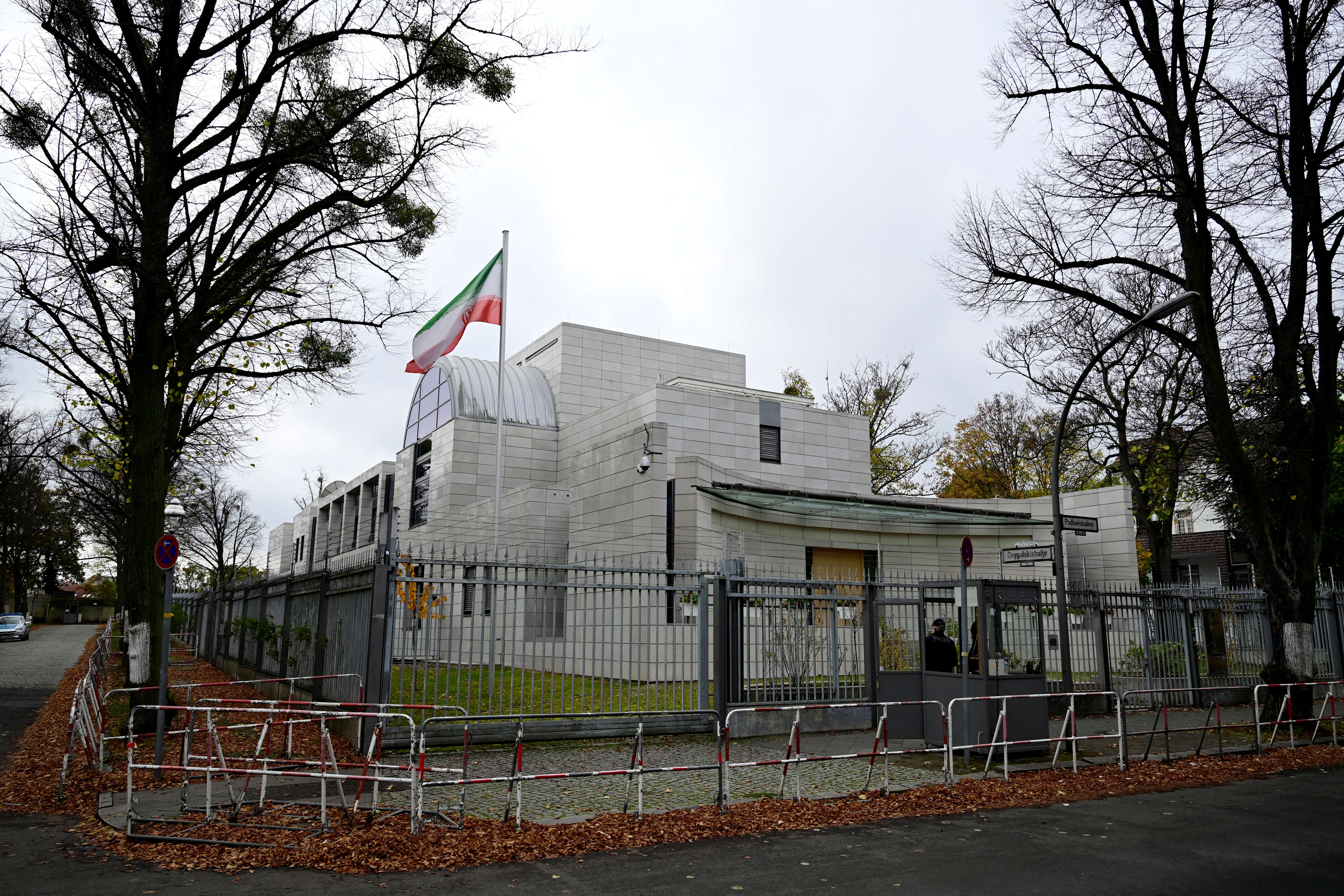
A photo taken on October 29, 2024, shows an exterior view of the Iranian Embassy in Berlin, Germany, a day after Iran executed 69-year-old German-Iranian Sharmahd, who was sentenced to death in February 2023 for the capital offense of “corruption on Earth.” Iran’s Foreign Minister Abbas Araghchi on October 29 lambasted remarks by his German counterpart Foreign Minister Baerbock criticizing Iranian authorities over the execution of dual national Jamshid Sharmahd. On October 29, Berlin summoned Iran’s charge d’affaires to “convey its strong protest against the actions of the Iranian regime.” (Photo by John Macdougall / Agence France-Presse)
BERLIN — Germany will close the three Iranian consulates on its soil in response to the execution of German-Iranian Jamshid Sharmahd, Foreign Minister Annalena Baerbock said Thursday.
“We have repeatedly and unequivocally made it clear to Tehran that the execution of a German citizen will have serious consequences,” Baerbock said, announcing the closure of the consulates in Frankfurt, Munich, and Hamburg in a televised announcement.
The execution, announced on Monday, had already provoked tit-for-tat diplomatic protests, with Chancellor Olaf Scholz calling it a “scandal.”
“The fact that this assassination took place in the light of the latest developments in the Middle East shows that (Iran’s) dictatorial, unjust regime… does not act according to normal diplomatic logic,” Baerbock said.
“It is not without reason that our diplomatic relations are already at an all-time low,” she said.
The closures will affect a total of 32 consular staff, according to the foreign ministry.
READ: Iran’s secret service accused of plots to kill Jews in Europe
The Iranian Foreign Ministry responded Thursday evening, denouncing the “irrational decision” that “cannot be justified,” and said it had summoned Berlin’s ambassador to Tehran to convey Iran’s “strong protest.”
Baerbock did not mention Iran’s embassy in Berlin but said Germany would “continue to maintain our diplomatic channels and our embassy in Tehran.”
Among other reasons, this was necessary in order for the government to continue to press for the release of the other German citizens whom “the regime is unjustly detaining,” she said.
Sharmahd, 69, had been sentenced to death in February 2023 for the capital offense of “corruption on Earth,” a sentence later confirmed by the Iranian Supreme Court.
He had been convicted of playing a role in a 2008 mosque bombing in the southern city of Shiraz, in which 14 people were killed and 300 wounded.
His family have long maintained that Sharmahd was innocent and Amnesty International said he had been the victim of a “show trial.”
But Iran has defended his execution and declared that “a German passport does not provide impunity to anyone, let alone a terrorist criminal.”
READ; Israel and Iran trade charges of endangering Middle East peace
Germany is also understood to be pushing for further sanctions against Iran at the EU level.
“In Brussels I have been pushing for the Revolutionary Guards to be listed as a terror organisation,” Baerbock said on Thursday.
The EU’s top diplomat Josep Borrell earlier this week said the bloc condemned Sharmahd’s “killing in the strongest possible terms” and was “considering measures in response.”
Sharmahd, a German citizen of Iranian descent and a US resident, was a software engineer who had worked and written for an Iranian opposition group’s website based abroad that strongly criticised the Islamic republic’s leadership.
He was seized by Iranian authorities in 2020 while travelling through the United Arab Emirates, according to his family.